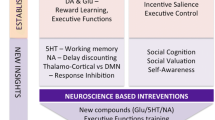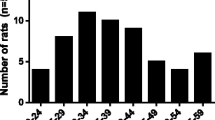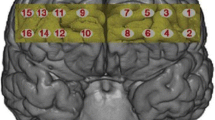Abstract
Rationale
MDMA (ecstasy; +3,4-methylenedioxymethamphetamine) damages brain serotonin (5-HT) neurons and, in non-human primates, a loss of various 5-HT axonal markers persists for several years. This raises the question of whether long lasting effects occur in human beings that persist even after they have stopped using MDMA.
Objectives
We therefore assessed the effects of an indirect 5-HT manipulation on functions thought to be affected by MDMA use in people who had stopped using MDMA (ex-users) compared with continuing users and non-users.
Methods
Ninety-six participants were recruited: 32 ex-users who had stopped using MDMA for >1 year (mean, 2.4 years); 32 current users and 32 polydrug controls who had never used MDMA but were matched with ex-users and controls on cannabis use and pre-morbid IQ. Participants were given an amino acid mixture that contained either no tryptophan (T−) or augmented tryptophan (T+) and assessed before and 5 h after the drink on measures of cognitive function and mood.
Results
T+ and T− produced plasma tryptophan augmentation and depletion, respectively, in all three groups. Ex-users' plasma tryptophan levels in response to T+ were significantly higher than other groups. Ex-users' performance on a delayed prose recall task improved after T+ and lessened after T−. Changes in ex-users' free plasma tryptophan levels correlated highly (r=−0.9) with their baseline performance on immediate and delayed prose recall; change in total plasma tryptophan correlated (r=−0.81) with delayed recall. Further, total baseline plasma tryptophan correlated with number of years they had used MDMA before quitting. Baseline differences between groups were found on learning, working memory, aggression and impulsivity. T− did not produce differential effects in the three groups.
Conclusions
Our results suggest that prolonged abstinence from MDMA might be associated with altered tryptophan metabolism. Ex-users showing the poorest memory function at baseline were also those who metabolised least tryptophan. These findings may reflect pre-morbid differences in 5-HT function of those who stop using this drug or consequences of MDMA use that emerge after abstention. Aggression is also associated with MDMA use and subsequent abstinence.





Similar content being viewed by others
References
Anderson IM, Parry-Billings M, Newsholme EA, Fairburn CG, Cowen PJ (1990) Dieting reduces plasma tryptophan and alters brain 5-HT function in women. Psychol Med 20:785–791
Barratt ES, Patton JH (1983) Impulsivity: cognitive, behavioural and psychophysiological correlates. In: Zucherman M (ed) Biological basis of sensation feeling, impulsivity and anxiety. Erlbaum, Hillsdale, NJ
Battaglia G, Yeh SY, de Souza EB (1988) MDMA-induced neurotoxicity: parameters of degeneration and recovery of brain serotonin neurons. Pharmacol Biochem Behav 29:269–274
Battig WF, Montague WE (1969) Category norms of verbal items in 56 categories. A replication and extension of the Connecticut category norms. J Exp Psychol 80:1–46
Beck AT (1978) The Beck Depression Inventory (BDI). The Psychological Corporation, Harcourt Brace Jovanovitz, USA
Benkelfat C, Ellenbogen MA, Dean P, Palmour RM, Young SN (1994) Mood-lowering effect of tryptophan depletion. Enhanced susceptibility in young men at genetic risk for major affective disorders. Arch Gen Psychiatry 51:687–697
Bhattachary S, Powell JH (2001)Recreational use of 3,4-methylenedioxymethamphetamine (MDMA) or "ecstasy": evidence for cognitive impairment. Psychol Med 31:647–658
Bolla KI, McCann UD, Ricaurte GA (1998) Memory impairments in abstinent MDMA ("ecstasy") users. Neurology 51:1532–1537
Bond AJ, Lader MH (1974) The use of analogue scales in rating subjective feelings. Br J Med Psychol 47:211–218
Bond AJ, Wingrove J, Critchlow DG (2001) Tryptophan depletion increases aggression in women during the premenstrual phase. Psychopharmacology 156:477–480
Buhot MC (1997) Serotonin receptors in cognitive behaviors. Curr Opin Neurobiol 7:243–254
Buschke H, Fuld PA (1974) Evaluating storage, retention and retrieval in disordered memory and learning. Neurology 11:1019–1025
Buss AH, Perry M (1992) The aggression questionnaire. J Person Soc Psychol 63:452–459
Cleare AJ, Bond AJ (1995) The effect of tryptophan depletion and enhancement on subjective and behavioural aggression in normal male subjects. Psychopharmacology 118:72–81
Croft RJ, Mackay AJ, Mills AT, Gruzelier JG (2001) The relative contributions of ecstasy and cannabis to cognitive impairment. Psychopharmacology 153:373–379
Curran HV (2000) Is MDMA ("ecstasy") neurotoxic in humans? An overview of evidence and of methodological problems in research. Neuropsychobiology 42:34–41
Curran HV, Hildebrandt M (1999) Dissociative effects of alcohol on recollective experience. Conscious Cognit 8:497–509
Curran HV, Brignell C, Fletcher S, Middleton P, Henry JA (2002) Cognitive and subjective dose -response effects of acute oral Δ9-tetrahydrocannabinol (THC) in infrequent cannabis users. Psychopharmacology 164:61–70
Davison D, Parrott AC (1997) Ecstasy (MDMA) in recreational users: self-reported psychological and physiological effects. Hum Psychopharmacol 12:221–226
Delgado PL, Charney DS, Price LH, Aghajanian GK, Landis H, Heninger GR (1990) Serotonin function and the mechanism of antidepressant action. Arch Gen Psychiatry 47:411–418
Delgado PL, Price LH, Miller HL, Salomon RM, Aghajanian GK, Heninger GR, Charney DS (1994) Serotonin and the neurobiology of depression. Effects of tryptophan depletion in drug-free depressed patients. Arch Gen Psychiatry 51:865–873
Fernstrom JD, Wurtman RJ (1972) Brain serotonin content: physiological regulation by plasma neutral amino acids. Science 178:414–416
Fletcher JM, Page JB, Francis DJ, Copeland K, Naus MJ, Davis CM, Morris R, Krauskopf D, Satz P (1996) Cognitive correlates of long-term cannabis use in Costa Rican men. Arch Gen Psychiatry 53:1051–1057
Gartside SE, Cowen PJ, Sharp T (1992) Effects of 5-hydroxy-l-tryptophan on the release of 5-HT in rat hypothalamus in vivo as measured by microdialysis. Neuropharmacology 31:9–14
Gerra G, Zaimovic A, Giucastro G, Maestri D, Monica C, Sartori R, Caccavari R, Delsignore R (1998) Serotonergic function after (±)3,4-methylene-dioxymethamphetamine ("ecstasy") in humans. Int Clin Psychopharmacol 13:1–9
Gouzoulis-Mayfrank E, Daumann J, Tuchtenhagen F, Pelz S, Becker S, Kunert H-J, Fimm B, Sass H (2000) Impaired cognitive performance in drug free users of recreational ecstasy (MDMA). J Neurol Neurosurg Psychiatry 68:719–725
Green AR, Cross AJ, Goodwin GM (1995) Review of the pharmacology and clinical pharmacology of 3,4-methylenedioxymethamphetamine (MDMA or "ecstasy"). Psychopharmacology 19:247–260
Grob CS (2000) Deconstructing ecstasy: the politics of MDMA research. Addict Res :549–588
Hatzidimitriou G, McCann UD, Ricaurte GA (1999) Altered serotonin innervation patterns in the forebrain of monkeys treated with (±)3,4-methylenedioxymethamphetamine seven years previously: factors influencing abnormal recovery. J Neurosci 19:5096–5107
Klaassen T, Riedel WJ, Deutz NE, van Someron A, van Praag HM (1999) Specificity of the tryptophan depletion method. Psychopharmacology 141:279–286
Klugman, A, Hardy S, Baldeweg T, Gruzelier J (1999) Toxic effect of MDMA on brain serotonin neurons. Lancet 353:1269–1270
Liechti ME, Gamma A, Vollenweider FX (2001) Gender differences in the subjective effects of MDMA. Psychopharmacology 154:161–168
Liester MB, Grob CS, Bravo GL, Walsh RN (1992) Phenomenology and sequelae of 3,4-methylenedioxymethamphetamine use. J Nerv Ment Dis 180:345–352
McCann, UD, Ridenour A, Shaham Y, Ricaurte GA (1994) Serotonin neurotoxicity after (±)3,4- methylenedioxymethamphetamine (MDMA; "ecstasy"): a controlled study in humans. Neuropsychopharmacology 10:129–138
McCann UD, Szabo Z, Scheffel U, Dannals RF, Ricaurte GA (1998) Positron emission tomographic evidence of toxic effect of MDMA ("ecstasy") on brain serotonin neurons in human beings. Lancet 352:1433–1437
Meneses A (1999) 5-HT system and cognition. Neurosci Biobehav Rev 23:1111–1125
Moja EA, Cipolla P, Castoldi D, Tofanetti O (1989) Dose-response decrease in plasma tryptophan and in brain tryptophan and serotonin after tryptophan-free amino acid mixtures in rats. Life Sci 44:971–976
Morgan MJ (1999) Memory deficits associated with recreational use of "ecstasy" (MDMA). Psychopharmacology 141:30–36
Morgan MJ, McFie L, Fleetwood H, Robinson J (2002) Ecstasy (MDMA) are the psychological problems associated with its use reversed by prolonged abstinence? Psychopharmacology 159:294–303
Nelson HE (1982) The national adult reading test (NART): test manual. NFER-Nelson, Windsor, UK
O'Shea E, Granados R, Esteban B, Colado MI, Green AR (1998) The relationship between the degree of neurodegeneration of rat brain 5-HT nerve terminals and the dose and frequency of administration of MDMA ("ecstasy"). Neuropharmacology 37:919–926
Park SB, Coull JT, McShane RH, Young AH, Sahakian BJ, Robbins TW, Cowen PJ (1994) Tryptophan depletion in normal volunteers produces selective impairments in learning and memory. Neuropharmacology 33:575–588
Parrott AC, Lees A, Garnham NJ, Jones M, Wesnes K (1998) Cognitive performance in recreational users of MDMA or "ecstasy": evidence for memory deficits. J Psychopharmacol 12:79–83
Reidel WJ, Klaassen T, Deutz NE, van Someren A, van Praag HM (1999) Tryptophan depletion in normal volunteers produces selective impairment in memory consolidation. Psychopharmacology 141:362–369
Reilly JG, McTavish SF, Young AH (1997) Rapid depletion of plasma tryptophan: a review of studies and experimental methodology. J Psychopharmacol 11:381–392
Reneman L, Lavalaye J, Schmand B, de Wolff FA,van den Brink W, den-Heeten GJ, Booij J (2001) Cortical serotonin transporter density and verbal memory in individuals who stopped using 3,4-methylenedioxymethamphetamine (MDMA or "ecstasy"): preliminary findings. Arch Gen Psychiatry 58:901–906
Ricaurte GA, Yuan J, McCann UD (2000) (±)3,4-Methylenedioxymethamphetamine ("ecstasy")-induced serotonin neurotoxicity: studies in animals. Neuropsychobiology 42:5–10
Ricaurte GA, Yuan J, Hatzidimitriou G, Cord B, McCann UD (2002) Severe dopaminergic neurotoxicity in primates after a common recreational dose regimen of MDMA ("ecstasy"). Science 297:2260–2263
Rodgers J (2000) Cognitive performance amongst recreational users of "ecstasy". Psychopharmacology 151:19–24
Scheffel U, Szabo Z, Matthews WB, Finley PA, Dannals RF, Ravert HT, Szabo K, Yuan J, Ricaurte GA (1998) In vivo detection of short and long-term MDMA neurotoxicity—a positron emission tomography study in the living baboon brain. Synapse 29:183–192
Schmitt JA, Jorissen BL, Sobczak S, van Boxtel M P, Hogervorst E, Deutz NE, Riedel WJ (2000) Tryptophan depletion impairs memory consolidation but improves focussed attention in healthy young volunteers. J Psychopharmacol 14:21–29
Shansis FM, Busnello JV, Quevedo J, Young S, Izquierdo I, Kapczinski F (2000) Behavioural effects of acute tryptophan depletion in healthy volunteers. J Psychopharmacol 14:157–163
Smith KA, Fairburn CG, Cowen PJ (1997) Relapse of depression after rapid depletion of tryptophan. Lancet 349:915–919
Speilberger C, Garsuch R, Lushene R (1970) Manual for the state-trait anxiety inventory. Consulting Psychologists Press, Palo Alto, California
Tiihonen J, Virkkunen M, Rasanen P, Pennanen S, Sainio E-L, Callaway J, Halonen P, Liesivuori J (2001) Free l-tryptophan plasma levels in antisocial violent offenders. Psychopharmacology 157:395–400
Verheyden S, Hadfield J, Callin T, Curran HV (2002) Sub-acute effects of "ecstasy" (+3,4 methylenedioxymethamphetamine) on mood: evidence of gender differences. Psychopharmacology 161:23–31
Verheyden S, Maidment R, Curran HV (2003) Quitting ecstasy: an investigation of why people stopped taking the drug and their subsequent mental health. J Psychopharmacol (in press)
Wareing M, Fisk JE, Murphy PN (2000) Working memory deficits in current and previous users of MDMA ("ecstasy"). Br J Psychol 91:181–188
Wesnes K, Warburton DM (1983) Effects of smoking on rapid visual information processing performance. Neuropsychobiology 9:233–229
Williams WA, Shoaf SE, Hommer D, Rawlings R, Linnoila M (1999) Effects of acute tryptophan depletion on plasma and cerebrospinal fluid tryptophan and 5-hydroxyindoleacetic acid in normal volunteers. J Neurochemistry 72:1641–1647
Wilson B, Cockburn J, Baddeley A (1985) The Rivermead behavioural memory test. Thames Valley Text, Reading, UK
Wolff K, Hay AW, Sherlock K, Conner M (1995) Contents of "ecstasy". Lancet 346:1100–1101
Young SN, Gautier S (1981) Effect of tryptophan administration on tryptophan, 5- hydroxyindoleacetic acid and indoleacetic acid in human lumbar and cisternal cerebrospinal fluid. J Neurol Neurosurg Psychiatry 44:323–327
Young SN, Smith SE, Pihl RO, Ervin FR (1985) Tryptophan depletion causes a rapid lowering of mood in normal males. Psychopharmacology 87:173–177
Zakzanis KK, Young DA (2001) Memory impairment in abstinent MDMA ("ecstasy") users: a longitudinal investigation. Neurology 56:966–969
Acknowledgements
This study was aided by a grant to H.V.C. from the University of London Central Research Fund. S.V. was supported by a Medical Research Council (UK) studentship. The authors are extremely grateful to all the people who generously gave up their time to participate in this study. They also thank Dr. Martin Boback for providing medical cover, Prof. John Henry for helpful discussion and Dr. Mike Franklin for analyses of tryptophan levels.A preliminary report of this study was presented at the National Institute of Drug Abuse conference: "MDMA/Ecstasy Research: Advances, Challenges and Future Directions", July 19–20th, 2001. Neither author has any involvement, financial or otherwise, that might potentially bias their work.
Author information
Authors and Affiliations
Corresponding author
Rights and permissions
About this article
Cite this article
Curran, H.V., Verheyden, S.L. Altered response to tryptophan supplementation after long-term abstention from MDMA (ecstasy) is highly correlated with human memory function. Psychopharmacology 169, 91–103 (2003). https://doi.org/10.1007/s00213-003-1463-5
Received:
Accepted:
Published:
Issue Date:
DOI: https://doi.org/10.1007/s00213-003-1463-5




